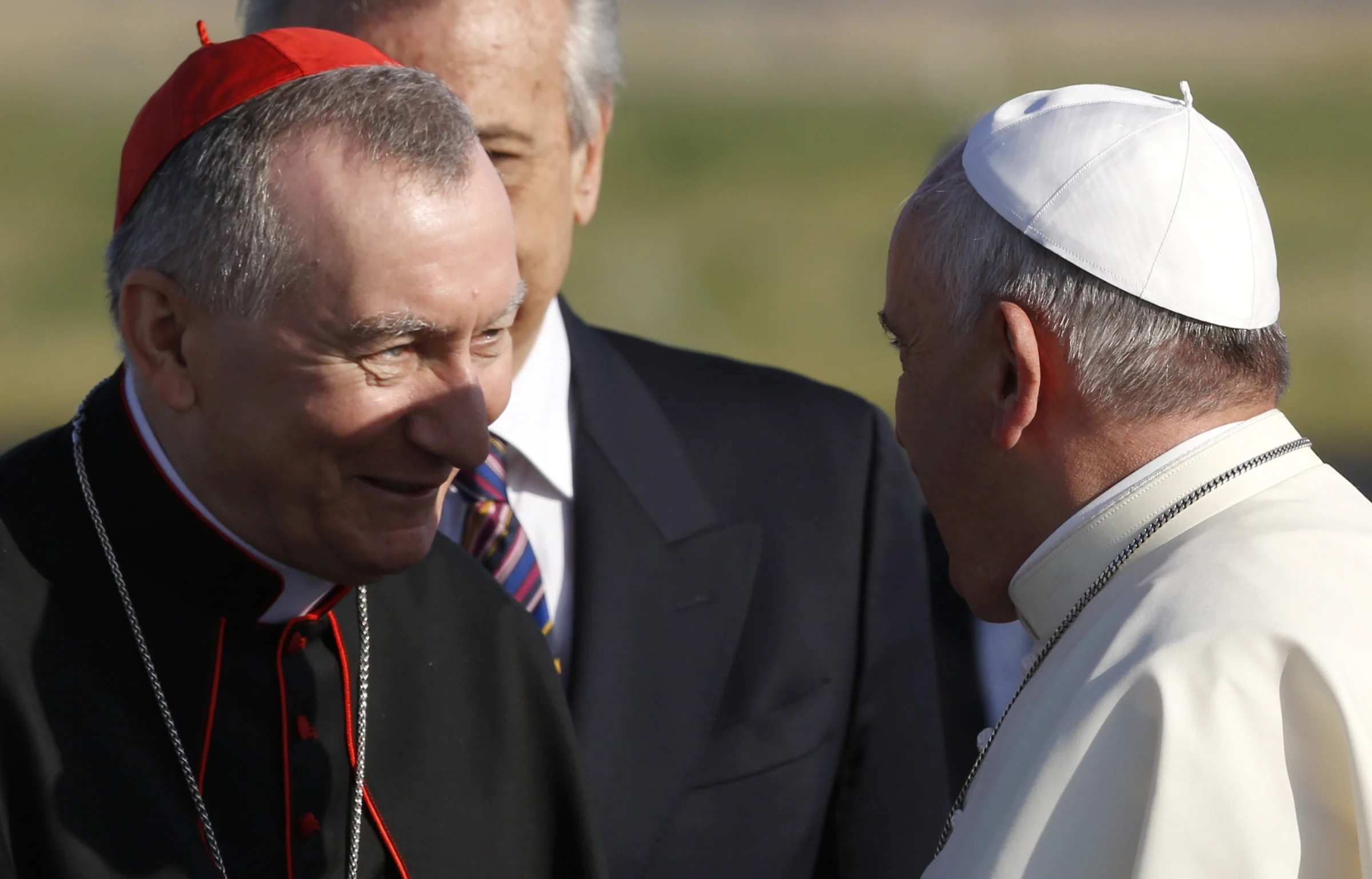Vatican diplomats seek to defuse outrage over Pope Francis' Ukraine 'white flag' comments

The Vatican secretary of state is seeking to defuse outrage over Pope Francis' latest diplomatic foray, insisting in media interviews that a primary condition for negotiations to end the war in Ukraine is an end to Russia’s aggression and that any peace must be a “just peace.”
Pope Francis greets Vatican Secretary of State Monsignor Pietro Parolin, left, as he arrives to board a plane to Amman, Jordan, for a three-day trip to the Middle East including the West Bank and Israel, at Rome's Fiumicino international airport, Saturday, May 24, 2014. The Vatican secretary of state is trying to defuse Pope Francis' latest diplomatic kerfluffle, insisting in media interviews that a primary condition for negotiations to end the war in Ukraine is an end to Russia’s aggression and that any peace must be a “just peace.”
Cardinal Pietro Parolin, the Vatican’s chief diplomat, made the rounds with friendly Italian media the same day Kyiv summoned the Holy See ambassador to complain about Francis’ comments that Ukraine should have the “courage of the white flag” to negotiate an end to the war.
Francis’ remarks to Swiss broadcaster RSI, recorded in early February but only aired on Saturday, elicited immediate criticism from Ukraine and its allies, even after the Vatican press office tried to redirect attention to Francis’ other remarks in the interview that “negotiation is never a surrender.”
The ruckus once again put the Vatican’s diplomatic corps in the position of having to smooth over Francis’ informal, off-the-cuff way of speaking, providing a more articulated position in line with the Holy See’s tradition of calibrated diplomatic neutrality.
In an interview with leading Corriere della Sera published Tuesday, Parolin noted that Francis in another speech last month had called for a diplomatic solution in Ukraine and the search for a just and lasting peace.
“In that sense, it’s obvious that the creation of such conditions aren’t just for one side, but both sides, and the first condition would be that of putting an end to the aggression,” Parolin said in comments that also were reported by the Vatican’s in-house Vatican News portal.
Parolin noted that Francis’ “white flag” comments were in response to a question that used the term, and that the pontiff subsequently insisted that “negotiation is never a surrender.”
The cardinal made similar comments to Italy's state-run RAI, saying: "Peace in Ukraine will have to be a just peace. It means recognizing mutual rights and also mutual duties, above all, taking into account the dignity of people.”
It’s not the first time Francis’ sometimes imprecise way of speaking, which is often appreciated in other contexts because of its simplicity, have created a diplomatic headache for the Holy See and angered one or the other side in the war.
He has repeatedly expressed solidarity with the “martyred” Ukrainian people but refused to call out Russia or President Vladimir Putin by name. He has seemingly expressed understanding for the invasion Putin ordered by saying NATO was “barking at Russia’s door” by expanding east, but then earned a formal protest from Moscow when he blamed most of the cruelty on Chechens and other minorities.
In September, Francis again courted the displeasure of Ukrainians, including its Greek Catholic bishops, when he praised Russia’s imperial past during a meeting with Russian youths. After Ukrainians voiced their sense of betrayal, Francis later acknowledged his words were “perhaps not happy” and that he in no way meant to justify Russia’s invasion.
'Activist pope' hampers Vatican peace efforts with Ukraine comments
Pope Francis is a passionate advocate for peace but his latest controversial comments on Ukraine clash with the Vatican's official line and risk hampering its diplomatic efforts to end the war with Russia.
Ukraine should "have the courage to raise the white flag and negotiate" and do so "before things get worse", the 87-year-old pontiff said in an interview broadcast at the weekend.
A furious Kyiv accused the pope of ignoring international law, summoned the Vatican envoy and vowed "never" to surrender.
Francis's comments also attracted a lot of criticism on social networks.
Pro-Ukrainian accounts depicted him with the face of Russian President Vladimir Putin or dressed in the colours of Russia, which has seized large swathes of Ukrainian territory since its fully-fledged invasion in February 2022.
Despite Francis's repeated calls for peace, he is often accused of sowing confusion.
"It was an unfortunate use of the term 'white flag', which is synonymous with surrender," one Vatican source told AFP, on condition of anonymity.
"It surprised a lot of people."
The Vatican attempted to explain it away by insisting that "white flag" in this situation meant "a cessation of hostilities".
Secretary of State Pietro Parolin, the pope's number two, insisted in an interview with the Corriere della Sera newspaper on Tuesday that Francis had called for the conditions for a diplomatic solution which would lead to a lasting peace.
"The prerequisite" for a negotiated solution is to "put an end to the aggression... and the aggressors must first of all be the ones to cease fire," he said, without naming Russia or Putin directly.
- 'Advantages, limits' -
This is not the first time that the head of the Catholic Church has sparked controversy with comments on the conflict.
At the end of 2022, the Vatican apologised to Moscow after the pope referred to the allegedly cruel behaviour of Russian ethnic minorities.
And in August 2023, Francis invited young Russian Catholics to claim the heritage of the "great Russia" of Peter the Great and Catherine II.
Kyiv accused him of relaying "imperialist propaganda" from Moscow, forcing the Holy See to clarify.
Vatican experts are increasingly asked whether these are papal blunders or reflect Francis's real position.
His predecessors had "a culture of Western diplomacy", said Francois Mabille, director of the Geopolitical Observatory of Religion at the Institute of International and Strategic Affairs (IRIS) in Paris.
But the Argentine pope has "a non-European outlook, with advantages but also limits", he told AFP.
Vatican expert John Allen said the pontiff's actions were "neither arbitrary nor irrational".
"They are a deliberate response to how the Catholic Church is changing -- and will continue to change -- in the 21st century," he wrote in the Atlantic, referring to its decline in Europe and growth elsewhere.
As Italian Vaticanist Marco Politi told AFP, Francis is "diplomatically isolated among NATO countries" but is "on the same wavelength as the majority of states in the world".
He is also capturing public sentiment, even in the West.
This is because "a large part of European and even American public opinion does not want to exhaust itself in a war of attrition" or pay a heavy economic price, Politi said.
- 'Activist pope' -
Francis's most controversial comments are unscripted and are often made during interviews.
While John Paul II improvised little, and "Benedict XVI was truly a man of the written word", Francis "is a pope who speaks a lot", including to the press.
This multiplies the risks of veering off message, Mabille said.
Francis, "fundamentally pacifist... is more of an activist pope than the head of state popes we have known before", he said.
Often criticised for his solitary exercise of power, Francis regularly leaves his press office or diplomats scrambling.
"We see a sort of dissociation between the pontifical word and the word of the diplomatic apparatus," Mabille said.
"The secretariat of state is almost systematically obliged to try to explain his words."
The Vatican has been seeking to use on Ukraine its ultra-discreet diplomacy, which boasts previous successes such as a resumption of diplomatic relations between the United States and Cuba in 2014.
But Francis's regular appeals for peace appear to fall on deaf ears, while the diplomatic tour by his emissary, Italian Cardinal Matteo Zuppi, has largely gone unnoticed, despite stops in Beijing, Kyiv, Moscow and Washington.
- Questions and Answers
- Opinion
- Story/Motivational/Inspiring
- Technology
- Art
- Causes
- Crafts
- Dance
- Drinks
- Film/Movie
- Fitness
- Food
- Παιχνίδια
- Gardening
- Health
- Κεντρική Σελίδα
- Literature
- Music
- Networking
- άλλο
- Party
- Religion
- Shopping
- Sports
- Theater
- Wellness
- News
- Culture
- War machines and policy


